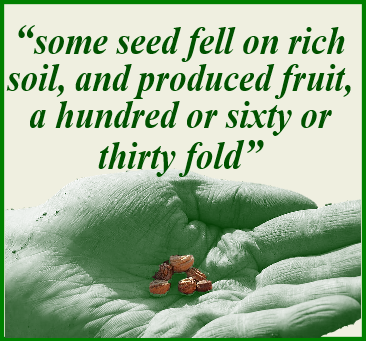Readings: Isaiah 55:10-11; Romans 8:18-23; Matthew 13:1-23
Theme: Co-workers in the birth of a New Creation
Jesus’ favourite way of teaching was by using stories or parables. There are over 30 parables in Matthew’s gospel alone. We might wonder why Jesus adopted this method of teaching. Well, for one thing, the use of stories was a method hallowed among the rabbis of Israel from time immemorial. However, Jesus’ reason for using stories is perhaps best illustrated by the following fable:
Once upon a time, Truth walked down a village street as naked as the day he was born. Horrified, the villagers ran back to their houses and locked their doors. Taken aback, Truth continued walking until he met Story coming down the road facing him, smiling and dressed to the nines and noticing his dejection, she asked him why he was so sad. ‘Nobody wants me, he said. As soon as they see me coming, the all run away’. ‘That’s because you’re naked’, responded Story. ‘People are afraid of naked truth. Look, I’ll make you some nice clothes and we’ll see how people respond’. Reluctantly, Truth agreed, and two weeks later dressed himself in the suit Story had made for him. At first, he felt rather uncomfortable to be all covered up. But when people began to accept him and welcome into their homes, he relaxed. Soon Truth and Story became best friends, eventually married and had three children: a boy and two girls. Their names were: Myth, Fable and Parable.
A story makes truth more approachable and leads us to discover it for ourselves. And it also makes it more memorable. We recall a story much more readily than an abstract discourse. Today’s gospel reading from Matthew narrates the familiar parable of the sower and the different kinds of soil on which the seed falls. This story encourages us to reflect on our lives and our response to the good news of God’s loving reign. It invites each of us to ask: What kind of soil am I? Am I receptive to God’s word? Do I nurture it regularly and carefully? Do I let it to penetrate my heart, so that I become God’s co-worker in the birth of a new creation?
The sower, as depicted by Jesus, sows seeds with prodigious liberality, seemingly unconcerned that some may be lost or fail to bear fruit. This is an image of a God who, in the words of the Kerry poet, Brendan Kennelly, ‘goes about his work/determined to hold on to nothing’, the God who, ‘embarrassed at the prospect of possession/distributes leaves to the wind/and lets them pitch and leap like boys capering out of their skin.’ The word of God is strewn everywhere around us, in ‘pictures thrown behind hedges/poems that skitter backwards over cliffs’. Were we to but open out eyes and free up our hearts we could not miss the presence to this unbelievably generous God ‘who gives everything away’. Today’s gospel calls on us to open our hearts to the gracious seeds of God’s presence scattered so abundantly in our world – a world that, in the striking words of the poet, Gerard Manley Hopkins, is ‘charged with the grandeur of God’.
The problem is that we so often don’t pay enough attention to that word or let it take root in the soil of our hearts. That soil can become dry and hard through neglect, or get choked with weeds – and there are a lot of weeds around in these days. It may require clearing and cultivation to become receptive to the seed of God’s word. For most of us, the cultivation of the soil of our hearts remains a constant and demanding challenge but, as Isaiah reminds us in today’s first reading, we must not lose heart. God’s word will accomplish the purpose for which it was sent. And that purpose, as our second reading today makes clear, includes the transformation of all created things. ‘From the beginning till now the entire creation, as we know, has been groaning in one great act of giving birth’ (Rom 8: 21).
Creation is not destined for extinction, as some proponents of ‘Extinction Rebellion’ might have us believe. It is intended to share in the glory of Christ’s resurrection. However, it is surely groaning today under the relentless impact of human exploitation. Our destiny and the destiny of creation are inseparably connected, and we have a God-given responsibility to work for a renewed creation. While it is God who ultimately liberates and transforms, we are invited to be his active representatives, working with him, and under his authority, to develop, heal, and restore the created world.
Creation will be freed from its enslavement to human greed only when our hearts are transformed by the seed of God’s word and we learn to live as his children and citizens of his kingdom. St Paul’s reminds us that, while we have received the first-fruits of the Spirit, we, too ‘groan inwardly’ as we struggle to allow God’s Spirit to reign in our hearts, and transform us so that we become his co-workers in the birth of the new creation. So, let us give thanks to the Lord for his invitation to us today, and let us continue to prepare the soil of our hearts to receive the seed of God’s word and enable it to produce abundant fruit.
Michael McCabe SMA
To listen to an alternative Homily for this Sunday, from Fr Tom Casey of the SMA Media Centre, Ndola, Zambia please click on the play button below.
|
|

